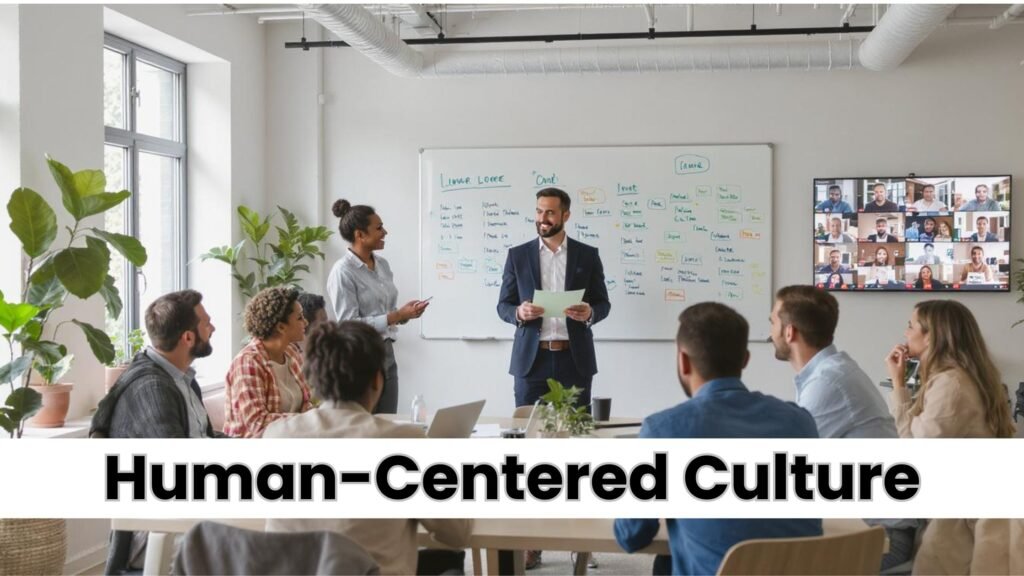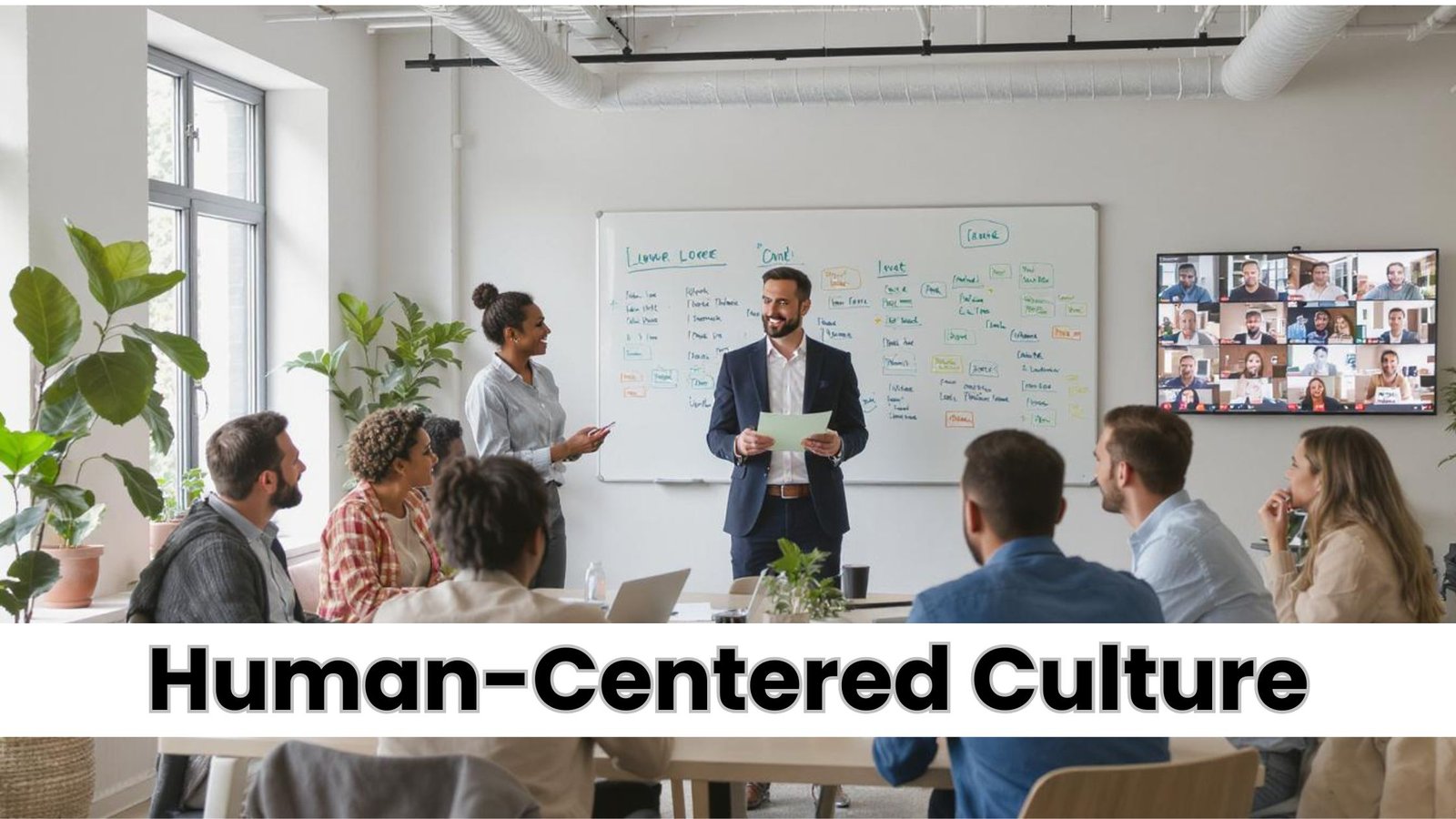In today’s fast-evolving business landscape, workplace agility is essential for staying competitive and responsive. At the core of achieving this agility is a Human-Centered Culture, where employees are recognized, empowered, and valued. Bizinfopro Company emphasizes that organizations that prioritize people over processes or technology alone unlock innovation, resilience, and adaptability. A Human-Centered Culture ensures that teams are equipped to respond effectively to change and seize new opportunities.

Understanding Workplace Agility
Workplace agility is the organization’s capacity to adapt quickly and efficiently to changes in markets, technology, and customer expectations. While tools and frameworks can support agility, the true driver is people. Human-Centered Culture ensures employees are engaged, motivated, and empowered to make decisions, innovate, and collaborate, providing the foundation for sustainable agile practices.
Employees as the Core of Success
Human-Centered Culture treats employees as central to organizational success rather than as replaceable resources. This approach fosters accountability, creativity, and ownership, allowing individuals to adapt and innovate. When employees feel respected and included, they actively contribute to problem-solving, driving innovation, and organizational agility.
Beyond Agile Frameworks: Culture First
Many organizations rely heavily on agile methodologies such as Scrum, Lean, or Kanban to enhance performance. However, these tools alone cannot create lasting agility without a supportive culture. Human-Centered Culture embeds agile practices into daily work while emphasizing collaboration, trust, and empowerment. Teams in this environment are adaptive, resilient, and able to respond effectively to emerging challenges.
Engagement Drives Agility
Employee engagement is a vital component of agility. Human-Centered Culture fosters engagement by acknowledging achievements, providing opportunities for growth, and involving employees in decision-making. Engaged employees take initiative, collaborate effectively, and respond proactively to change, fueling workplace agility across the organization.
Developing Critical Human Skills
Technical expertise is no longer enough. Modern workplaces require human skills such as emotional intelligence, adaptability, collaboration, and creativity. Human-Centered Culture nurtures these skills through mentorship, continuous learning, and safe experimentation. Supported employees are better equipped to handle uncertainty and drive agile outcomes.
Leadership That Empowers
Leadership is crucial for cultivating Human-Centered Culture. Traditional hierarchical models often hinder innovation and slow decision-making. Agile leaders focus on empowering employees, removing obstacles, and promoting collaboration. By fostering trust, transparency, and initiative, leaders enable teams to act decisively, reinforcing agility throughout the organization.
Technology as an Enabler
Technology can enhance workplace agility but only when employees are capable and confident in its use. Tools such as AI, cloud platforms, and workflow automation improve efficiency when paired with Human-Centered Culture. By prioritizing employee experience during technology adoption, organizations ensure smooth integration, better utilization, and optimized agility.
Diversity and Inclusion Enhance Agility
Human-Centered Culture thrives on diversity and inclusion. Embracing varied perspectives, backgrounds, and experiences strengthens problem-solving, creativity, and adaptability. Inclusive teams feel valued and empowered, leading to higher engagement and collaboration. Diversity becomes a key driver of workplace agility and innovation.
Proactive Mindset and Continuous Learning
Agility involves anticipating challenges as well as responding to them. Human-Centered Culture encourages employees to share insights, propose solutions, and engage in continuous learning. This proactive approach allows organizations to remain competitive, innovative, and prepared for emerging trends and challenges.
Prioritizing Employee Well-Being
Workplace agility cannot be sustained without employee well-being. Stress, burnout, and disengagement hinder performance and responsiveness. Human-Centered Culture prioritizes mental health, work-life balance, and supportive practices, ensuring employees remain motivated, resilient, and capable of adapting to change.
Knowledge Sharing and Collaboration
Collaboration and knowledge-sharing are critical to agile workplaces. Human-Centered Culture fosters cross-functional teamwork, open communication, and mentorship. Sharing knowledge accelerates problem-solving, drives innovation, and ensures teams are prepared to respond effectively to new challenges, embedding agility across the organization.
Trust and Transparent Communication
Trust is a cornerstone of Human-Centered Culture. Employees need psychological safety to experiment, share ideas, and take risks. Transparent communication ensures alignment with organizational goals, strategy, and priorities. When trust exists, employees act decisively, collaborate effectively, and embrace agility as a natural part of daily operations.
Flexible Performance Systems
Traditional performance management systems can inhibit agility by focusing on rigid targets. Human-Centered Culture promotes flexible performance evaluation, continuous feedback, and adaptive goals. This approach empowers employees to focus on meaningful outcomes, respond to shifting priorities, and contribute to a more responsive and agile organization.
Resilience Through Human-Centered Culture
Finally, Human-Centered Culture strengthens organizational resilience—the ability to recover from disruptions, adapt quickly, and sustain performance. Supported, engaged, and empowered employees are better equipped to innovate under pressure, maintain productivity, and drive organizational agility. The combination of resilience, trust, engagement, and collaboration ensures agility is not just achievable but sustainable.
Read Full Article : https://bizinfopro.com/blogs/hr-blogs/why-workplace-agility-begins-with-human-centered-culture/
About Us : BizInfoPro is a modern business publication designed to inform, inspire, and empower decision-makers, entrepreneurs, and forward-thinking professionals. With a focus on practical insights and in‑depth analysis, it explores the evolving landscape of global business—covering emerging markets, industry innovations, strategic growth opportunities, and actionable content that supports smarter decision‑making.


